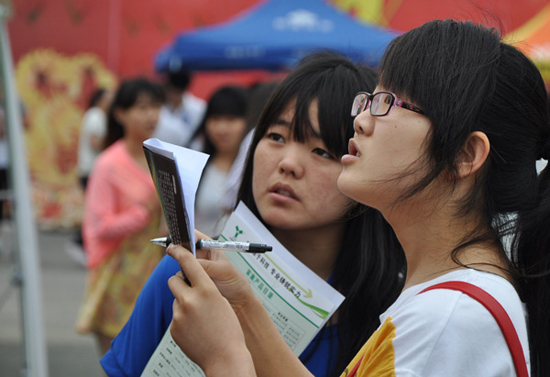
 |
| Animal husbandry and veterinary science graduates search for job opportunities at a fair held in Zhengzhou, capital of Henan province. (Yu Xiao / for China Daily) |
Low job satisfaction
Li Yang, director of the Vocational Counseling Center at China Agricultural University, said he has sensed a change in recruitment patterns.
"Many large companies that cooperated with our university have trimmed their recruitment quotas considerably because of the economic slowdown," he said.
"We used to set high standards when selecting the companies allowed to recruit graduates at our campus job fairs. But this year, we've had to lower the bar and a greater number of companies have become involved. We just haven't had enough applications from large, well-known businesses."
Usually, the university's last campus job fair is held in May. However, this year, in response to student demand, the college hosted a second large fair in mid-June.
"The results of the last fair seem to have been positive, although the final statistics are not yet available. The employment rate is likely to be similar to last year, but the job satisfaction rate is much lower," Li said.
Yang Shucheng, director of the Vocational Counseling Center at Dalian University of Technology in Liaoning province, expressed similar concerns.
"The days of waiting at the office for employers to approach us are over. To help students find jobs and attract businesses to our campus job fair, the school mobilized all the teachers and also asked alumni to invite their employers," Yang said.
"Every year, approximately 65 percent of our graduates choose to work in Northeast China and so regional economic development plays a major role in our employment plans," he said.
"Generally, mechanical engineering majors are in great demand, and several well-respected machinery manufacturers in Dalian employed a large number of graduates. But unfortunately, some of them have filed for bankruptcy this year. What's worse, many Japanese businesses in the city have also cut staff numbers, thus hampering many students' plans," he added.
In addition to China's economic slowdown, Yang said the disparity between supply and demand has exacerbated the rise in graduate unemployment levels.
Many companies based in the less-developed western region have failed to fill their employment quotas because a large number of students rate location as a top priority and have high expectations of working in big cities and for State-owned enterprises and governments, he said.
Young people in China will continue to face tough employment pressure in the coming five years, with the annual number of college graduates staying at around 7 million, according to data from the Ministry of Human Resources and Social Security.
The Worker's Gymnasium in Beijing holds job fairs four days a week, throughout the year, except on national holidays. The fairs mainly attract small and medium-sized companies.
However, on one late-June morning, many of the booths were unattended and the recruiting staff dozed at their desks.




















![]()
